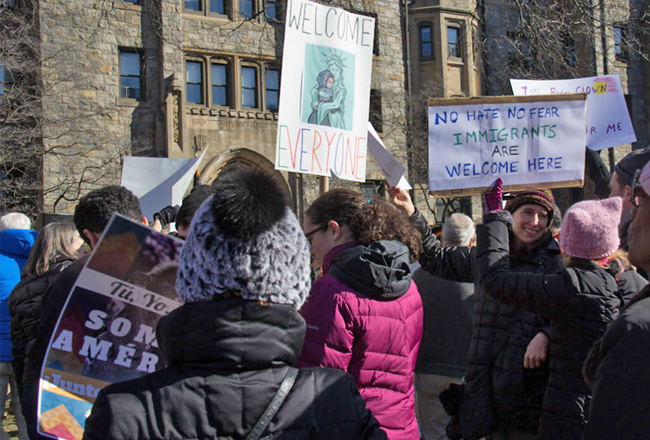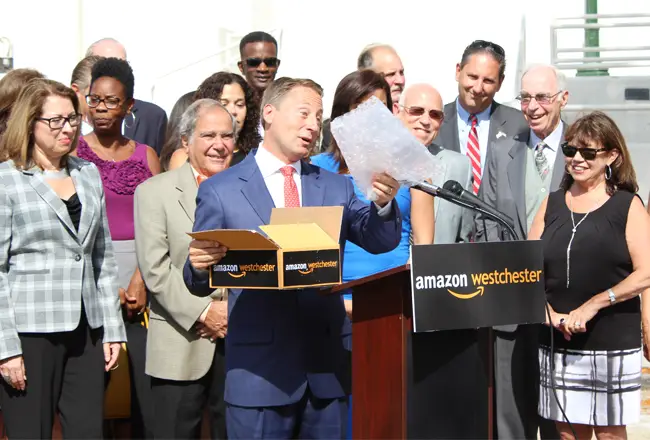An attempt to override Westchester County Executive Robert Astorino”™s veto of the Immigrant Protection Act failed by a single vote in the Westchester County Board of Legislators on Sept. 25.
Twelve votes were needed in order for the veto to be overturned. The vote was 11-6.
 All nine members of the Democratic Caucus voted in favor of overriding Astorino’s veto, along with Republican legislators David Gelfarb and James Maisano.
All nine members of the Democratic Caucus voted in favor of overriding Astorino’s veto, along with Republican legislators David Gelfarb and James Maisano.
“While we are not surprised by tonight”™s outcome, it truly is disappointing for the people of Westchester County,” members of the Democratic Caucus said in a statement following the vote. “Upholding the veto makes none of us safer.”
The act, which was passed by a 10-5 vote with two lawmakers absent on Aug. 7, would prevent Westchester County from using any of its resources to assist in federal investigations based on race, gender, sexual orientation, religion, ethnicity or national origin.
In his veto, Astorino said the act would designate Westchester as a “sanctuary county,” which he said could cost taxpayers nearly $13 million in federal funding.
Sanctuary jurisdictions are those that have ordinances or practices that obstruct immigration enforcement and shield criminals from U.S. Immigration and Customs Enforcement. Sanctuary jurisdictions run the risk of losing access to certain federal law enforcement grants if they prohibit officials from communicating with ICE.
The Immigrant Protection Act follows a model laid out by state Attorney General Eric Schneiderman aimed at protecting immigrant communities. The model provisions clarify that local law enforcement can limit their participation in federal immigration enforcement activities in several ways: by refusing to enforce federal nonjudicial civil immigration warrants; by denying federal requests to hold uncharged individuals in custody more than 48 hours; by limiting access of federal agents to individuals currently in custody; and by limiting information-gathering that will be used exclusively for federal immigration enforcement.
Last week, Astorino issued his own executive order that prohibits law enforcement from inquiring about a person”™s immigration status unless the officer is “required by law to do so, or is investigating illegal activity other than mere status as an undocumented alien.”
The order adds that county law enforcement will continue to cooperate with federal authorities in investigating and apprehending undocumented immigrants involved in criminal activity.
“While we wait for Washington to finally get its act together, Westchester will continue to protect all of its residents,” Astorino said. “However, if you end up in our jail for committing a crime, and you”™re not here legally, we”™re not providing a sanctuary to you and we will cooperate fully with federal immigration officials.”
Astorino said the order reinforces the county”™s existing procedure and replaces a 2006 order issued by then-County Executive Andrew Spano.
The order also prevents law enforcement from inquiring about a person”™s immigration status when individuals seek county services or when they are witnesses or victims of a crime. Officers are also required to cooperate with federal authorities in investigating and apprehending aliens suspected of criminal activity.
Astorino”™s executive order also prevents officers from apprehending individuals based solely on their suspected immigration status or race.
“Everyone in Westchester, no matter what their immigration status is, should feel safe to report crimes and seek medical attention,” Astorino said.
Astorino called the executive order a balanced compromise designed to foster trust within the immigrant community, while not providing sanctuary to criminals.
However, others felt the order does not go far enough in protecting immigrants.
“This order is a restatement of existing county policy without the clarity needed to truly protect immigrant residents of Westchester County,” said Karin Anderson Pozner, lead attorney with the Neighbors Link Community Law Practice. “It does nothing to end the practice of data sharing between county department of corrections and federal civil immigration authorities, even when there is no ongoing criminal investigation involving federal officials and even when the subject is innocent of any wrongdoing.”
Westchester County Legislator Catherine Borgia called the order a “half-step,” adding that the order could put immigrants at higher risk, allowing them to believe they will be provided with adequate protection.
“Recent federal action has shown that executive orders depend on the opinion and whim of a single individual,” she said. “They do not have the force of legislative action and can be easily rescinded.”






















